Abstract
OBJECTIVE--To determine whether dietary treatment has a similar antihypertensive effect to conventional drug treatment while being superior to drugs in improving serum lipid concentrations in obese men with mild hypertension. DESIGN--Six week run in period followed by randomisation to either diet or drug treatment groups for one year. SETTING--Outpatient clinic in city hospital. PATIENTS--61 Men aged 40-69 years, body mass index greater than or equal to 26, diastolic blood pressure 90-104 mm Hg when untreated. Exclusion criteria were signs of organ damage secondary to hypertension and diseases that might have interfered with compliance or with interpretation of results. INTERVENTIONS--Dietary treatment was based on weight reduction, restriction of sodium, and decrease of excess alcohol intake (defined as greater than or equal to 250 g alcohol per week). Drug treatment used a stepped care approach with atenolol as drug of first choice. MAIN OUTCOME MEASURES--Diastolic blood pressure less than 90 mm Hg; absolute reductions in blood pressure and serum lipid concentrations. RESULTS--Mean body weight decreased 7.6 kg in the diet group and increased 0.9 kg in the drug treatment group (p less than 0.0001), and mean sodium excretion decreased 42 and 10 mmol/24 h respectively (p = 0.019). There was no difference in reported alcohol intake. Mean systolic blood pressure decreased 4 mm Hg in the diet group and 16 mm Hg in the drug group (p = 0.003) and diastolic blood pressure 3 and 11 mm Hg respectively (p = 0.002). Diastolic blood pressure of 90 mm Hg was attained by 29% of the diet group (nine men) and 73% (22) of those receiving drug treatment (mean difference 44%, 95% confidence interval 21 to 67%, p = 0.001). Dietary treatment produced decreases in mean serum concentrations of total and low density lipoprotein cholesterol as well as triglycerides and an increase in high density lipoprotein cholesterol concentration. In the drug treatment group the changes were in the opposite direction, and the groups differed significantly in all but total cholesterol. CONCLUSIONS--Dietary treatment was inferior to conventional drug treatment in controlling mild hypertension but superior in lowering serum concentrations of lipids.
Full text
PDF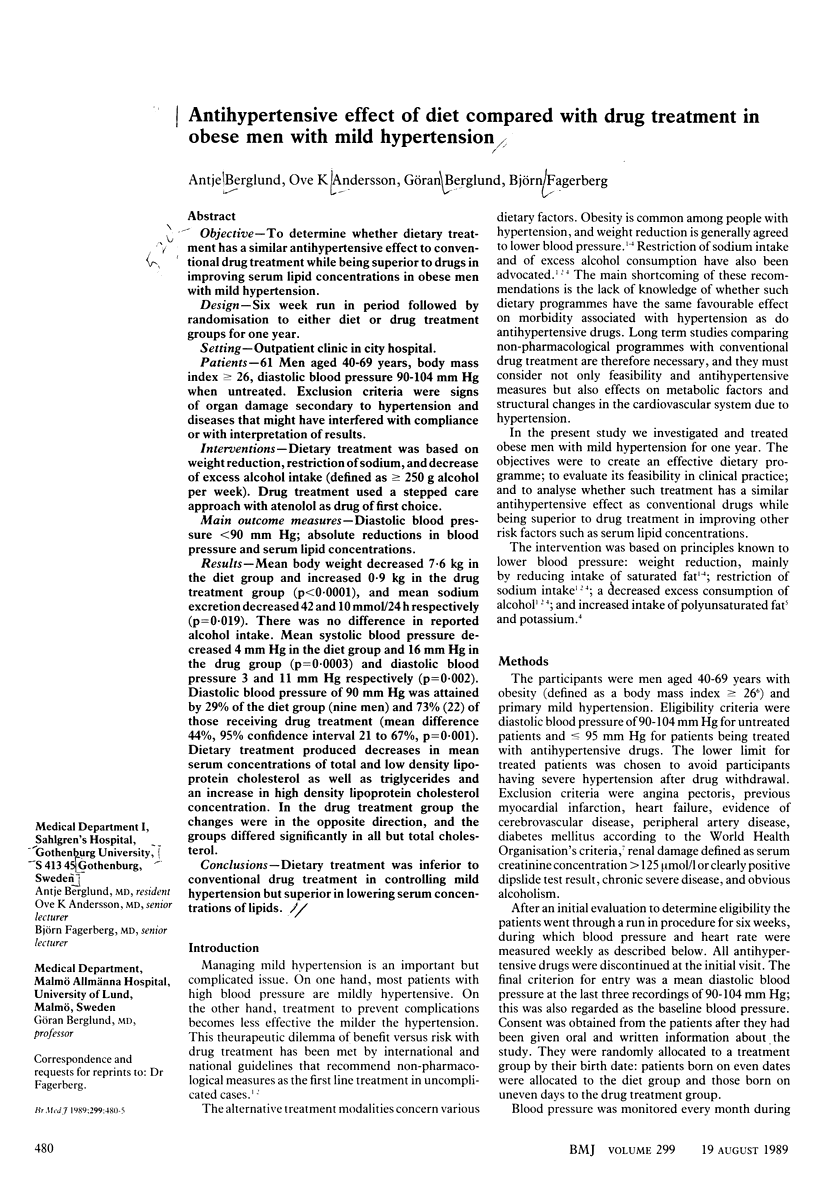
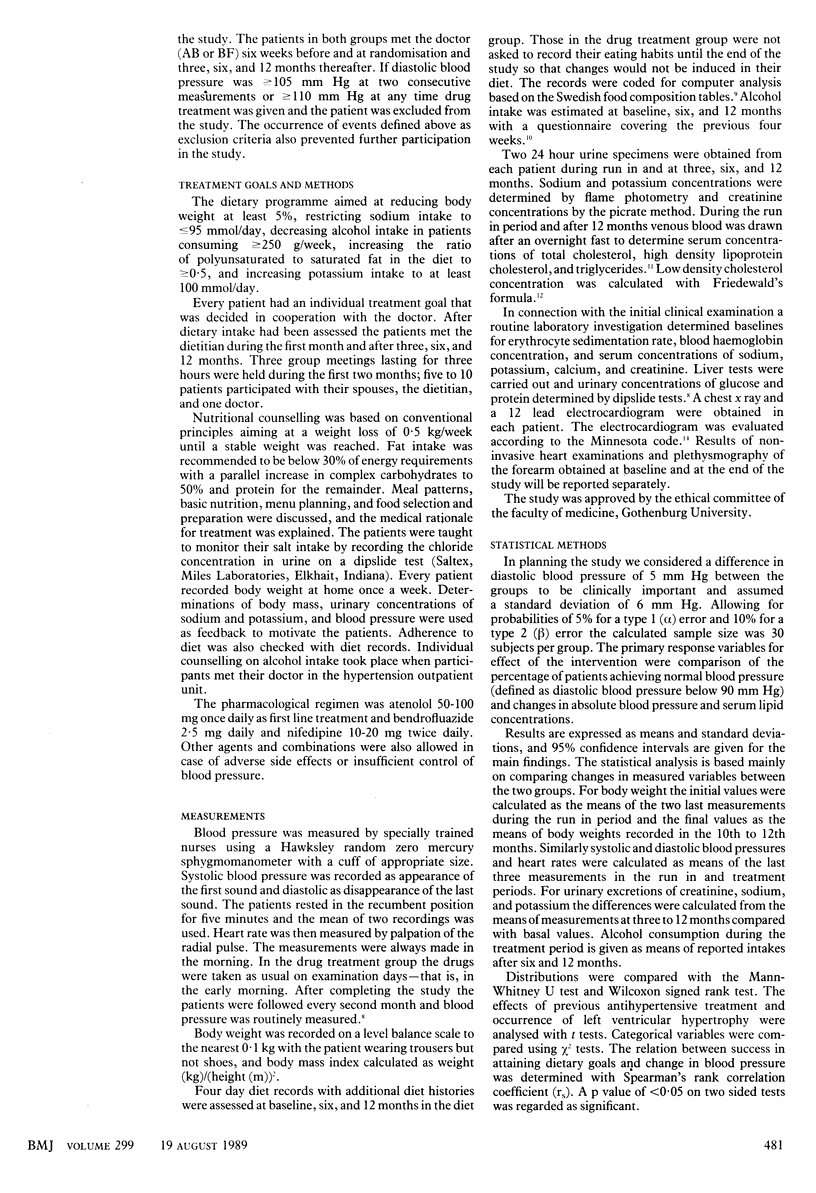
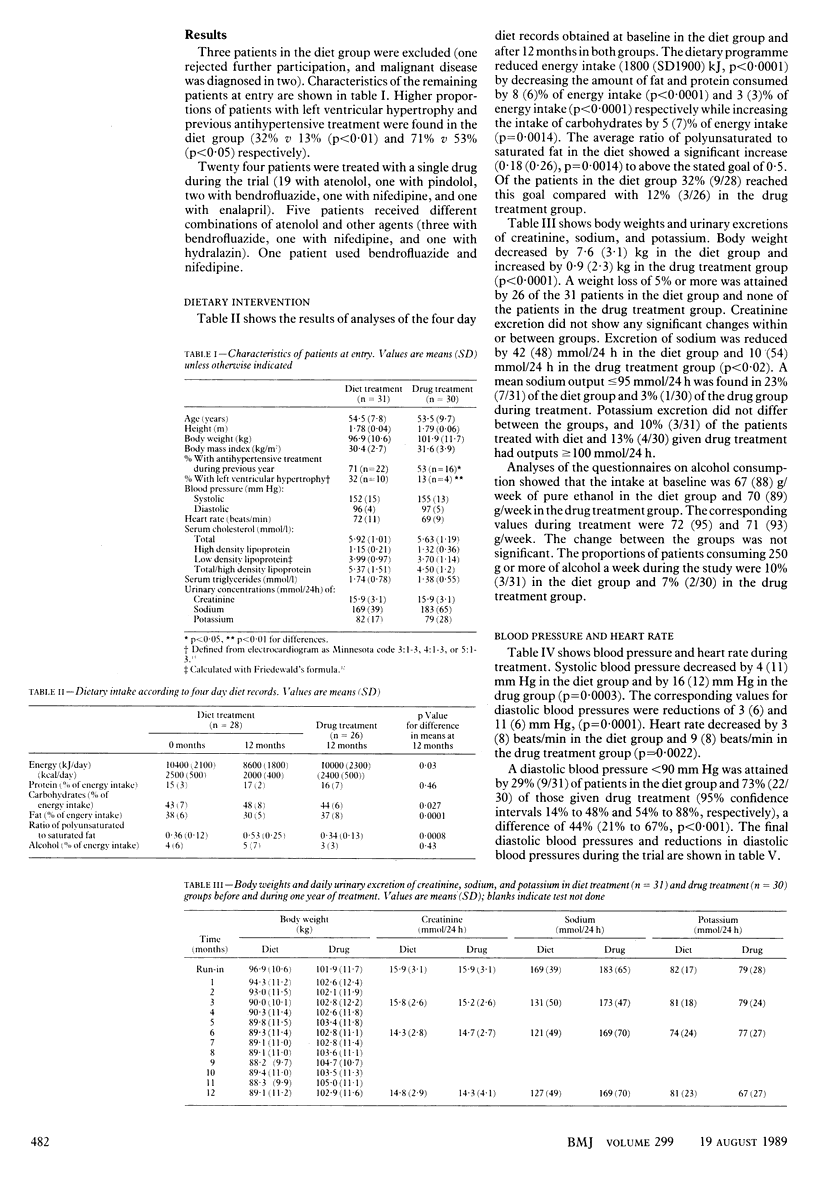
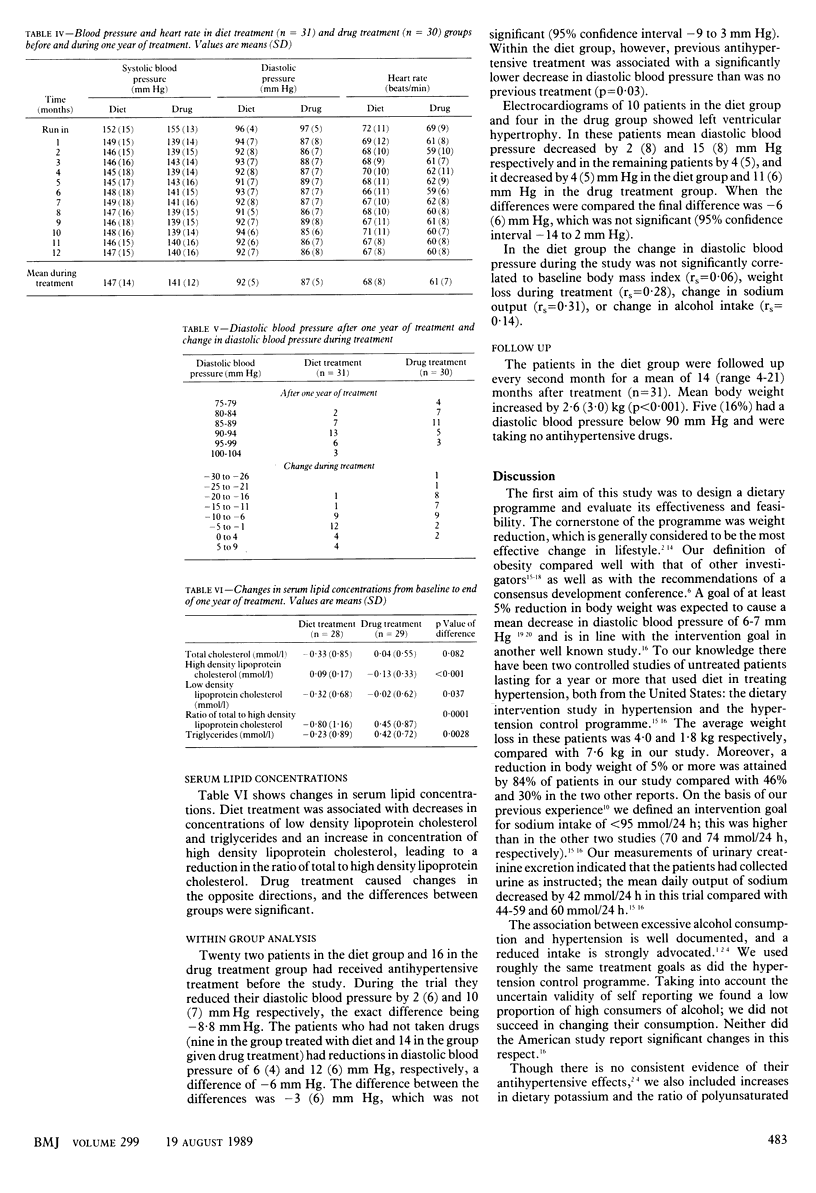
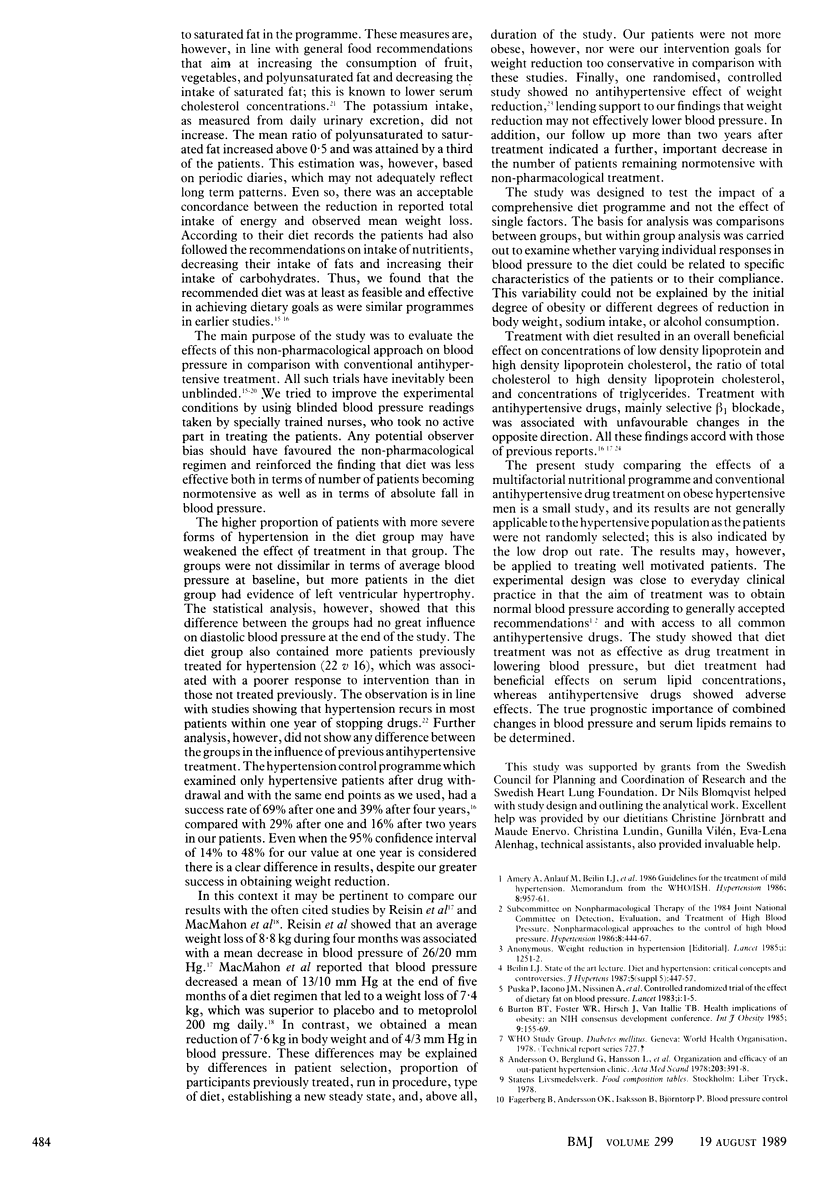
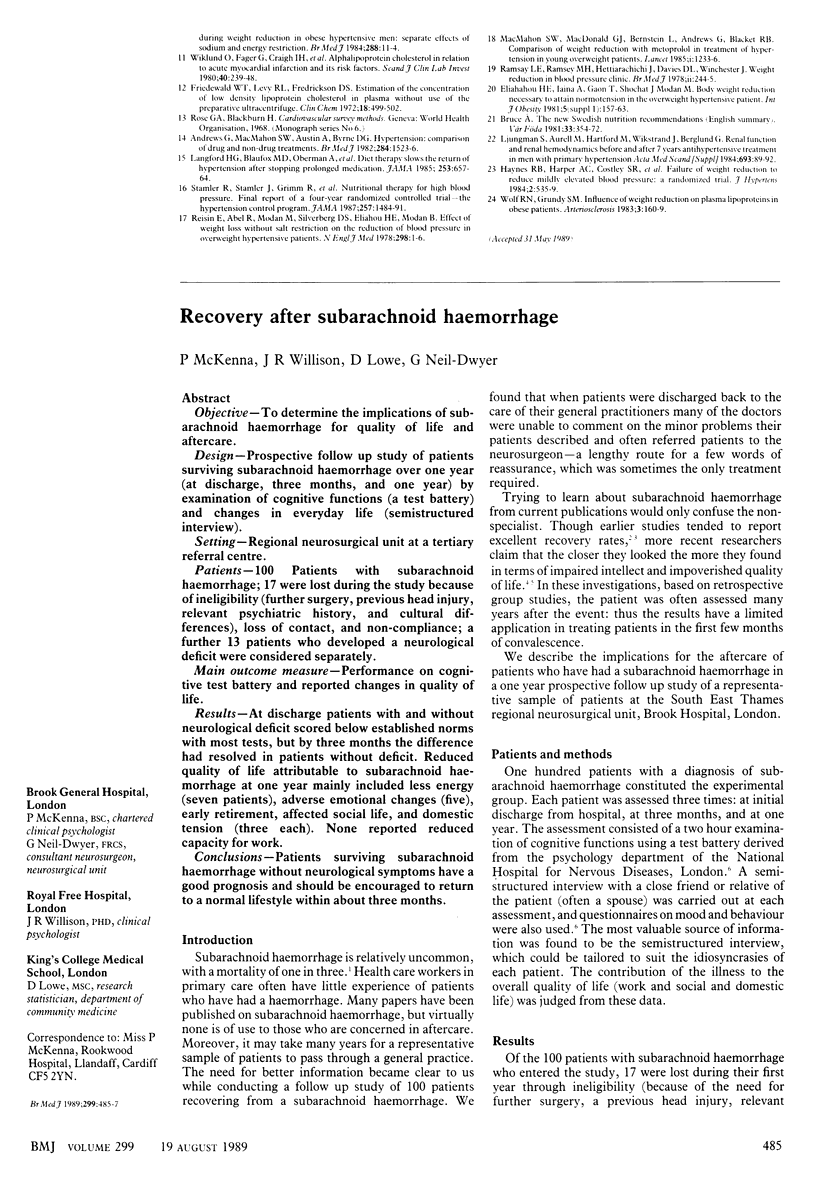
Selected References
These references are in PubMed. This may not be the complete list of references from this article.
- Anderson O., Berglund G., Hansson L., Sannerstedt R., Sivertsson R., Wikstrand J., Wilhelmsen L. Organization and efficacy of an out-patient hypertension clinic. Acta Med Scand. 1978;203(5):391–398. doi: 10.1111/j.0954-6820.1978.tb14894.x. [DOI] [PubMed] [Google Scholar]
- Andrews G., MacMahon S. W., Austin A., Byrne D. G. Hypertension: comparison of drug and non-drug treatments. Br Med J (Clin Res Ed) 1982 May 22;284(6328):1523–1526. doi: 10.1136/bmj.284.6328.1523. [DOI] [PMC free article] [PubMed] [Google Scholar]
- Eliahou H. E., Iaina A., Gaon T., Shochat J., Modan M. Body weight reduction necessary to attain normotension in the overweight hypertensive patient. Int J Obes. 1981;5 Suppl 1:157–163. [PubMed] [Google Scholar]
- Friedewald W. T., Levy R. I., Fredrickson D. S. Estimation of the concentration of low-density lipoprotein cholesterol in plasma, without use of the preparative ultracentrifuge. Clin Chem. 1972 Jun;18(6):499–502. [PubMed] [Google Scholar]
- Haynes R. B., Harper A. C., Costley S. R., Johnston M., Logan A. G., Flanagan P. T., Sackett D. L. Failure of weight reduction to reduce mildly elevated blood pressure: a randomized trial. J Hypertens. 1984 Oct;2(5):535–539. doi: 10.1097/00004872-198410000-00014. [DOI] [PubMed] [Google Scholar]
- Langford H. G., Blaufox M. D., Oberman A., Hawkins C. M., Curb J. D., Cutter G. R., Wassertheil-Smoller S., Pressel S., Babcock C., Abernethy J. D. Dietary therapy slows the return of hypertension after stopping prolonged medication. JAMA. 1985 Feb 1;253(5):657–664. [PubMed] [Google Scholar]
- MacMahon S. W., Macdonald G. J., Bernstein L., Andrews G., Blacket R. B. Comparison of weight reduction with metoprolol in treatment of hypertension in young overweight patients. Lancet. 1985 Jun 1;1(8440):1233–1236. doi: 10.1016/s0140-6736(85)92310-4. [DOI] [PubMed] [Google Scholar]
- Ramsay L. E., Ramsay M. H., Hettiarachchi J., Davies D. L., Winchester J. Weight reduction in a blood pressure clinic. Br Med J. 1978 Jul 22;2(6132):244–245. doi: 10.1136/bmj.2.6132.244. [DOI] [PMC free article] [PubMed] [Google Scholar]
- Stamler R., Stamler J., Grimm R., Gosch F. C., Elmer P., Dyer A., Berman R., Fishman J., Van Heel N., Civinelli J. Nutritional therapy for high blood pressure. Final report of a four-year randomized controlled trial--the Hypertension Control Program. JAMA. 1987 Mar 20;257(11):1484–1491. doi: 10.1001/jama.257.11.1484. [DOI] [PubMed] [Google Scholar]
- Wiklund O., Fager G., Craig I. H., Wilhelmsson C. E., Vedin A., Olofsson S. O., Bondjers G., Wilhelmsen L. Alphalipoprotein cholesterol levels in relation to acute myocardial infarction and its risk factors. Scand J Clin Lab Invest. 1980 May;40(3):239–247. doi: 10.3109/00365518009095573. [DOI] [PubMed] [Google Scholar]
- Wolf R. N., Grundy S. M. Influence of weight reduction on plasma lipoproteins in obese patients. Arteriosclerosis. 1983 Mar-Apr;3(2):160–169. doi: 10.1161/01.atv.3.2.160. [DOI] [PubMed] [Google Scholar]


